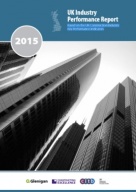2015 UK Industry Performance Report
On 17 September 2015, the annual UK Industry Performance Report based on the UK construction industry key performance indicators was published by Glenigan. The report was funded by the Construction Industry Training Board, supported by BRE SMARTWaste and endorsed by the Department of Business, Innovation and Skills and Constructing Excellence.
The report was based on construction projects completed during 2014. Some of its findings are summarised below:
- Project costs were on budget or better for 69% of projects, similar to 2013/14.
- Projects were on time or better 40% of the time, below the average of 45% in the years since 2003.
- Staff turnover increased to 5.3%, the highest since 2008.
- The proportion of women, people from black and minority ethnic backgrounds and those aged under 24, fell. The average proportion of women in the workforce fell from 19% to 13%, but this may be due to an increase in the number of site workers.
- Client satisfaction fell for the last three surveys.
- Ratings of service and value for money declined.
- Clients’ rating of consultancy teams was unchanged, remaining below previous peaks.
- Contractors’ satisfaction with clients and consults also fell.
- There were high levels of satisfaction with payment and information provision.
- Industry profitability rose to 2.8%, from 2.1% in the previous survey, but remained well below the 2009 peak of 9.9%.
- Projects became more environmentally efficient. Median energy use in construction was 199 kg CO2/ £100k project value, and the median project saw 21.6 m3 / £100k project value of waste removed from site.
- Building Information Modelling (BIM) was used on 13% of projects completed in 2014 compared to 9% in 2013 and 4% in 2012.
Stephen Radley, Director of Policy at CITB, said: “There are many positive results in this year’s report, but it shows there is no room for complacency. We welcome the return to growth, but project delays shows that the skills challenge is an issue for many across our industry.”
Allan Wilén, Economics Director at Glenigan, said: “The rapid upturn in activity during 2014 put pressure on capacity, manifesting itself in rising material and labour costs and extended delivery times. Evidence from this year’s KPIs suggests that construction firms have managed to keep control of costs, but delays to schedule have worsened… The construction industry is looking to a progressive growth in workload over the next few years. However the anticipated recovery presents fresh challenges: growing and up-skilling the workforce, delivering improved productivity and containing costs will be priorities.”
NB it is considered that the findings of the report may not be a full representation of the situation, as many of the projects competed during 2014 actually began during the depths of the recession.
Following publication of the report, CITB launched ‘Go Construct’, a new online service providing information about employment opportunities in the construction industry.
Featured articles and news
Statement from the Interim Chief Construction Advisor
Thouria Istephan; Architect and inquiry panel member outlines ongoing work, priorities and next steps.
The 2025 draft NPPF in brief with indicative responses
Local verses National and suitable verses sustainable: Consultation open for just over one week.
Increased vigilance on VAT Domestic Reverse Charge
HMRC bearing down with increasing force on construction consultant says.
Call for greater recognition of professional standards
Chartered bodies representing more than 1.5 million individuals have written to the UK Government.
Cutting carbon, cost and risk in estate management
Lessons from Cardiff Met’s “Halve the Half” initiative.
Inspiring the next generation to fulfil an electrified future
Technical Manager at ECA on the importance of engagement between industry and education.
Repairing historic stone and slate roofs
The need for a code of practice and technical advice note.
Environmental compliance; a checklist for 2026
Legislative changes, policy shifts, phased rollouts, and compliance updates to be aware of.
UKCW London to tackle sector’s most pressing issues
AI and skills development, ecology and the environment, policy and planning and more.
Managing building safety risks
Across an existing residential portfolio; a client's perspective.
ECA support for Gate Safe’s Safe School Gates Campaign.
Core construction skills explained
Preparing for a career in construction.
Retrofitting for resilience with the Leicester Resilience Hub
Community-serving facilities, enhanced as support and essential services for climate-related disruptions.
Some of the articles relating to water, here to browse. Any missing?
Recognisable Gothic characters, designed to dramatically spout water away from buildings.
A case study and a warning to would-be developers
Creating four dwellings... after half a century of doing this job, why, oh why, is it so difficult?
Reform of the fire engineering profession
Fire Engineers Advisory Panel: Authoritative Statement, reactions and next steps.
Restoration and renewal of the Palace of Westminster
A complex project of cultural significance from full decant to EMI, opportunities and a potential a way forward.
Apprenticeships and the responsibility we share
Perspectives from the CIOB President as National Apprentice Week comes to a close.

























